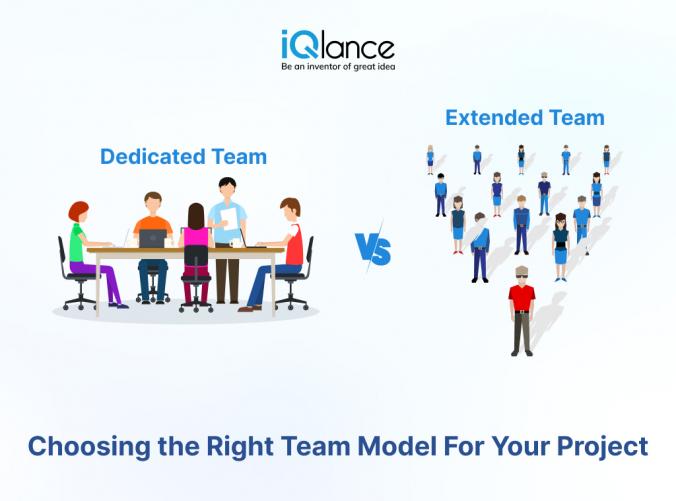The IT outsourcing industry is booming, set to hit a whopping $512.50 billion in revenue by 2024, with an expected growth rate of 10.99% that could reach $777.70 billion by 2028, according to Statista. This growth trend indicates a rising demand for flexible, innovative, and expert solutions. However, to Hire Dedicated Developers or choosing the right team model for your project isn’t a one-size-fits-all scenario. Businesses often find it challenging to pick between a dedicated team and an extended team. In this blog, we’ll guide you through the significance of team models, offer a straightforward comparison between dedicated and extended teams, and help you decide when to choose each model for optimal project success. What Is the Dedicated Software Team Model? A dedicated software team is a group of professionals, typically working full-time on a specific project for a long duration. This model is akin to having an in-house team but with the benefits of outsourcing, such as cost-effectiveness and access to a broader talent pool. The team comprises developers, designers, project managers, and other necessary roles, all working cohesively to achieve the project’s objectives. Benefits of a Dedicated Team Deep Engagement: The team is fully immersed in your project, leading to better understanding and commitment. Consistency and Reliability: With long-term involvement, the team becomes more stable and reliable. High Expertise: You get a team with specialized skills tailored to your project’s needs. Control and Flexibility: You have significant control over the project’s direction and can make adjustments as needed. When to Use a Dedicated Team Model Long-Term Projects: Ideal for projects expected to run for several months or years. Complex Projects: Suitable for projects requiring high levels of coordination and expertise. Ongoing Development: Perfect for continuous development and maintenance tasks. What Is the Extended Team Model? An extended team, often referred to as a staff augmentation model, involves integrating external professionals with your in-house team to fill specific skill gaps or increase capacity temporarily. This model is highly flexible and can adapt quickly to changing project needs. Benefits of an Extended Team Cost-Efficiency: Generally more affordable as you only Hire Dedicated Developers for the specific skills needed for a short term. Scalability: Easy to scale up or down based on project requirements. Quick Integration: Can be integrated swiftly with your existing team to meet immediate needs. Access to Specialized Skills: Ideal for projects requiring niche expertise. When to Use an Extended Team Model Short-Term Projects: Perfect for projects with a defined timeline and scope. Specialized Tasks: When you need specific skills that are not available in-house. Temporary Needs: To handle sudden increases in workload or to replace a temporarily unavailable team member.
-
- Categories
- Other
- Australia
- China
- New Zealand
- United States
- United Kingdom
- France
- Spain
- Italy
- Turkey
- Germany
- Malaysia
- Mexico
- Austria
- Russia
- Ukraine
- Thailand
- Saudi Arabia
- Greece
- Canada
- Poland
- Netherlands
- Singapore
- Hong Kong
- Taiwan
- South Korea
- Japan
- Brazil
- Argentina
- Indonesia
- Vietnam
- India
- Morocco
- South Africa
- Tunisia
- Zimbabwe
- Algeria
- Kenya
- Egypt
- United Arab Emirates
- Syria
- Jordan
- Iran
- Israel
- Qatar
- Dominican Republic
- Chile
- Puerto Rico
- Peru
- Uruguay
- Costa Rica
- Mauritius
- Sweden
- Nepal
- New
- Popular
- Gifts
- Videos
- Help / Contact Us
- Terms & Privacy
- What is TripTerest


